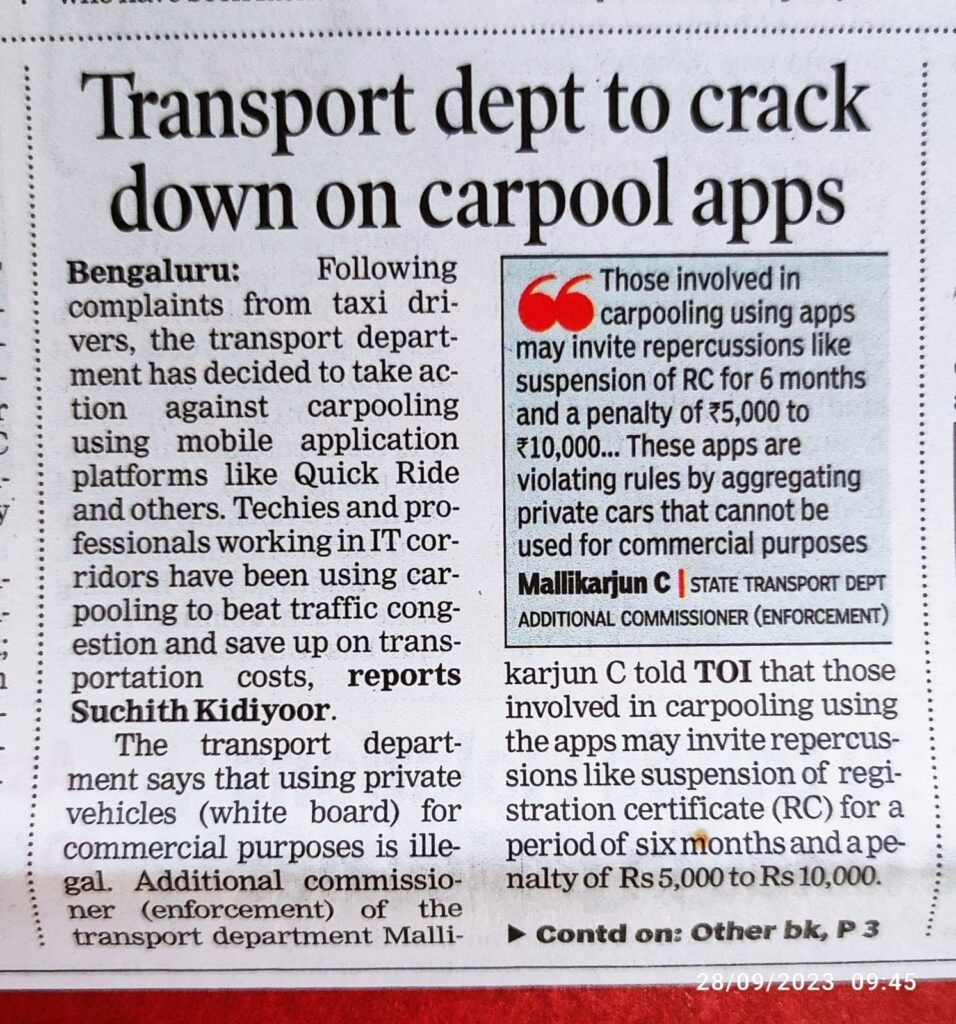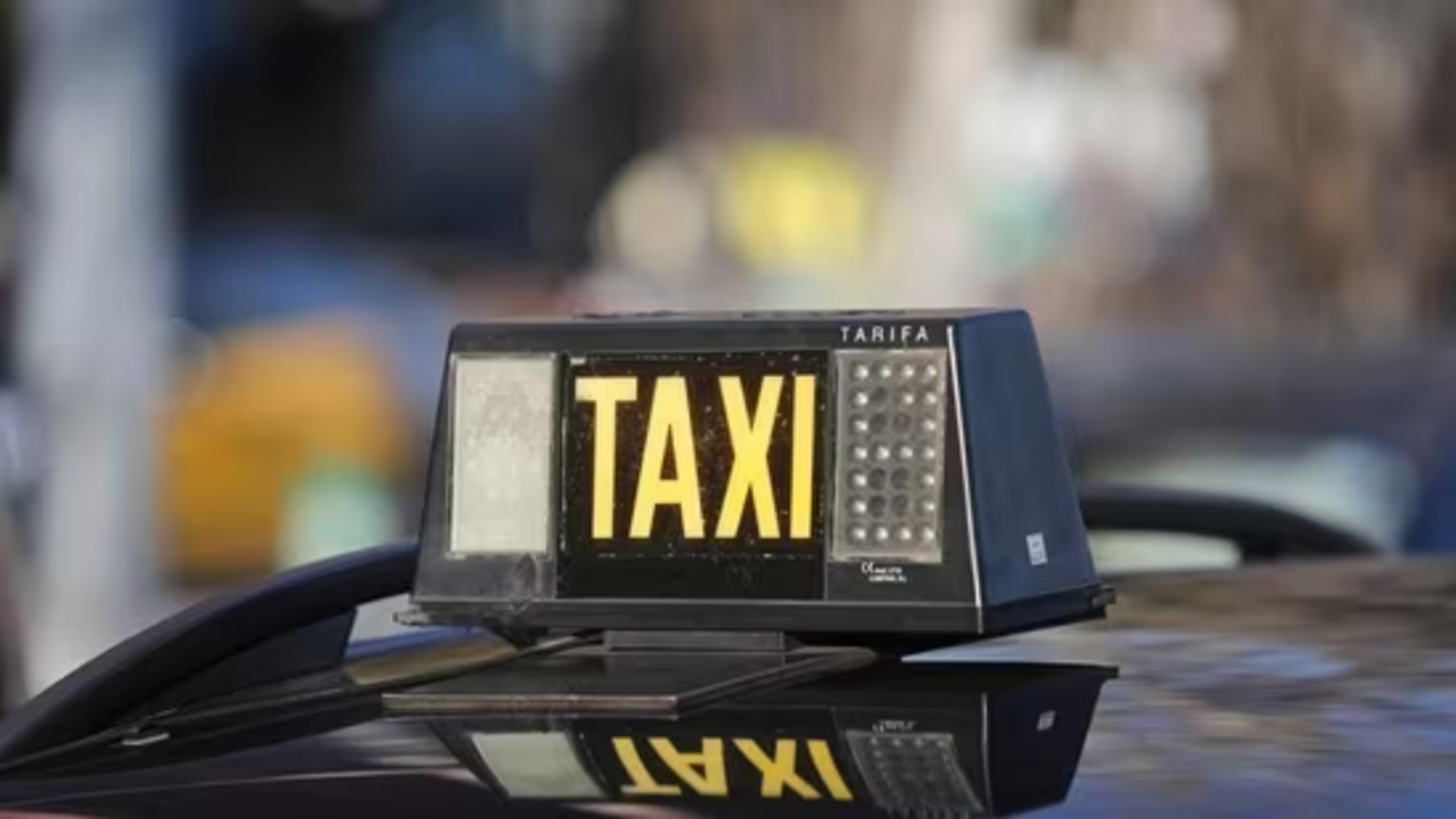Explore the impact of Bengaluru’s recent ban on carpooling, which comes with fines of up to ₹10,000, as traditional taxi services clash with ride-sharing platforms. Discover the city’s ongoing traffic congestion struggles and the challenges they pose for commuters.
In a significant and contentious development for commuters in Bengaluru, the Karnataka government has declared carpooling within the city officially banned. This decision comes following a series of complaints lodged by taxi driver associations, highlighting the growing tension between traditional taxi services and emerging carpooling apps. In an effort to regulate the situation, the state’s transport department has deemed the use of whiteboard vehicles for commercial commute purposes as ‘illegal,’ with penalties ranging from ₹5,000 to ₹10,000 for violators.
Carpooling Ban In Bengaluru
This move casts a shadow over popular ride-sharing platforms such as BlaBla Car, Quickride, Rideshare, Commute Easy, and Carpool Adda, which have been facilitating carpool services for individuals looking to share rides and expenses during their daily commutes.

Carpooling, once seen as a solution to alleviate traffic congestion during peak hours in Bengaluru, is now at the center of controversy. Many IT employees have come to rely on these services for their daily commute, often traveling from their homes to their workplaces. However, this convenience has raised concerns among taxi associations, which argue that carpooling services are significantly impacting their daily earnings.
These taxi associations, along with the autorickshaw drivers’ union, recently organized a Bengaluru bandh, drawing attention to their demands. In their list of grievances submitted to Karnataka’s Transport Minister, Ramalinga Reddy, the groups not only called for the ban on carpooling but also emphasized the need to address the issue of bike taxis. Minister Reddy has assured that the possibility of banning bike taxis will be duly examined within the confines of the law.
The decision to ban carpooling is a contentious one, particularly given Bengaluru’s notorious traffic woes. With a population of 11 million and approximately 12.5 million vehicles, the city boasts a vehicle for nearly every resident. This staggering density has led to frequent traffic gridlocks, particularly on the Outer Ring Road (ORR), home to numerous IT parks and global corporate investments.
Commuters navigating Bengaluru’s congested roads, especially on the ORR stretch, have often found themselves stuck in hours-long traffic snarls. Recognizing the pressing need to address this issue, Bengaluru’s traffic police are actively strategizing measures to alleviate recurring congestion on the ORR.
While the ban on carpooling aims to resolve some of the disputes between traditional taxi services and ride-sharing platforms, it also raises questions about the future of sustainable commuting solutions in a city plagued by traffic congestion. As Bengaluru continues to grapple with its transportation challenges, finding a balance between regulating carpooling services and ensuring convenient and efficient commutes for its residents remains a pressing concern.
Bengaluru, often referred to as India’s Silicon Valley, has experienced rapid urbanization and population growth in recent years. This influx of residents has led to an explosion in the number of vehicles on the city’s roads, making traffic congestion an everyday reality. With approximately 12.5 million vehicles in a city of 11 million people, Bengaluru has one of the highest traffic densities in the country, averaging nearly one vehicle per every resident.
The consequences of this traffic congestion are felt most acutely on the Outer Ring Road (ORR), which houses numerous IT parks and global corporate investments. The ORR has become synonymous with long, frustrating traffic delays, leaving commuters stranded for hours during their daily journeys to work. The situation has reached a breaking point, prompting Bengaluru’s traffic police to devise comprehensive strategies to address the chronic gridlock on this critical stretch of road.
Enter carpooling, once hailed as a beacon of hope for decongesting Bengaluru’s roads. Carpooling services allowed individuals to share rides, reducing the number of vehicles on the streets during peak hours. For many IT professionals, carpooling has become a lifeline, offering an economical and efficient way to travel to and from their workplaces.
However, the rise of carpooling didn’t sit well with traditional taxi services and autorickshaw drivers, who began to see a decline in their daily earnings. The taxi associations argued that carpooling platforms were siphoning off their customers and affecting their livelihoods. Fearing further economic strain, they decided to take matters into their own hands.
In a display of collective strength, taxi associations and the autorickshaw drivers’ union staged a massive protest in the form of a Bengaluru bandh. They rallied for their demands to be heard and acted upon. High on their list of grievances was the call for an outright ban on carpooling within the city limits.
This demonstration of dissatisfaction caught the attention of Karnataka’s Transport Minister, Ramalinga Reddy. The minister received a list of demands from the protesting groups and pledged to address their concerns. Among the demands was a request to examine the legal possibilities of banning bike taxis, another contentious issue that has been brewing in the city.
As a result of these protests and mounting pressure from traditional taxi services, the Karnataka government made the controversial decision to ban carpooling altogether. The transport department deemed the use of whiteboard vehicles for commercial commute purposes as ‘illegal.’ Violators of this ban now face fines ranging from ₹5,000 to ₹10,000, a significant penalty for those who rely on carpooling as a means of daily transportation.
This decision has sent shockwaves through the city, leaving many carpooling enthusiasts and daily commuters in a state of uncertainty. For years, they had embraced carpooling as a practical solution to ease their daily commutes and contribute to reducing traffic congestion. Now, they must rethink their transportation strategies.
The ban on carpooling also raises broader questions about the future of sustainable commuting solutions in Bengaluru. With the city’s traffic woes showing no signs of abating, how will residents find a balance between their need for convenient and efficient transportation and the government’s efforts to regulate the industry?
Bengaluru’s traffic congestion issue is not to be underestimated. The city’s rapid growth in population and the subsequent surge in vehicle ownership have overwhelmed its road infrastructure. The result is a daily struggle for residents, who find themselves spending a significant portion of their day stuck in traffic. The Outer Ring Road, in particular, has become synonymous with traffic gridlocks and delays.
Recognizing the urgency of the situation, Bengaluru’s traffic police have been working tirelessly to implement measures to alleviate congestion. These efforts include traffic management strategies, improving public transportation options, and encouraging alternative modes of commuting. Carpooling was one such alternative that gained popularity for its potential to reduce the number of vehicles on the road during peak hours.
However, the ban on carpooling now leaves a void in the array of transportation choices available to Bengaluru residents. Without the option to share rides through carpooling apps, commuters may once again find themselves caught in the never-ending traffic snarls that have become a hallmark of the city.
The ban on carpooling has also sparked a debate about the government’s role in regulating emerging transportation technologies and services. On one hand, traditional taxi services and autorickshaw drivers argue that the government should protect their livelihoods by curbing the growth of ride-sharing platforms. On the other hand, supporters of carpooling and similar services argue that these innovations provide much-needed convenience and cost-effectiveness to commuters in a city plagued by traffic congestion.
The decision to impose hefty fines on carpooling violators adds another layer of complexity to the issue. The prospect of paying fines ranging from ₹5,000 to ₹10,000 may deter many from using carpooling services, effectively eliminating a previously popular and environmentally friendly commuting option.
As Bengaluru grapples with these transportation challenges, it is clear that a delicate balance must be struck between regulating emerging technologies and ensuring the convenience and efficiency of daily commutes for its residents. The ban on carpooling, while addressing some concerns, has raised others and underscores the need for a comprehensive and forward-thinking approach to urban mobility in the city.
In conclusion, the ban on carpooling in Bengaluru represents a significant shift in the city’s transportation landscape. It is a response to mounting pressure from traditional taxi services and autorickshaw drivers, who argue that carpooling platforms are impacting their livelihoods.
However, the decision also poses questions about the future of sustainable commuting solutions in a city plagued by traffic congestion. As Bengaluru continues to grapple with its transportation challenges, finding a balance between regulating carpooling services and ensuring convenient and efficient commutes for its residents remains a pressing concern. The ban on carpooling has left many residents searching for alternative transportation options and underscores the need for a comprehensive and forward-thinking approach to urban mobility in the city.
also read JDS Joins NDA
